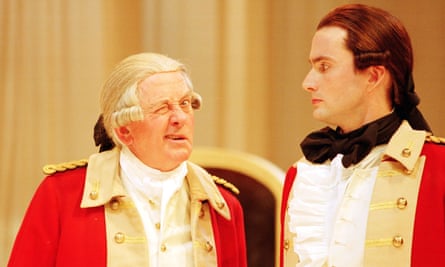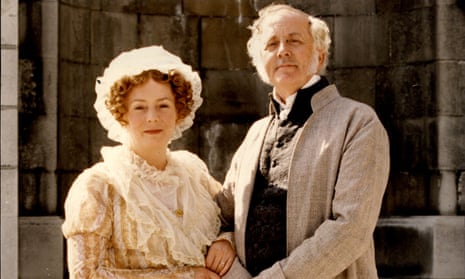‘Benjamin Whitrow has never given a bad performance,” said Laurence Olivier, who employed the actor in his National Theatre company at the Old Vic for seven years in the late 1960s. By the same token, you might deduce that Olivier never thought of Whitrow, who has died aged 80, as a barnstormer.
And you would be right. Whitrow’s stock-in-trade was an avuncular, measured rationality, a superb stillness on the stage and the capacity, very occasionally, to take you by surprise with a controlled outburst, or a frozen stare. Tall and lean, with a beautiful speaking voice, Whitrow was a master craftsman and, as such, luxury goods as a supporting player.
He may be best remembered for his resolute and placatory Mr Bennet in the great BBC TV serial of Pride and Prejudice (1995), with Jennifer Ehle as Elizabeth and Colin Firth shooting to stardom as Mr Darcy; Whitrow was a quietly hilarious buffer to Alison Steadman’s chaotically bustling Mrs Bennet.
Either side of that landmark, he appeared in three episodes of The New Statesman (1990-92) as Paddy O’Rourke, a Labour shadow minister with a fake Irish accent on the trail of Rick Mayall’s blunderbuss Alan B’Stard MP; and as Squire Allworthy in a serial of Tom Jones in 1997, co-starring Max Beesley, Samantha Morton, Frances de la Tour and Brian Blessed. These roles conferred a sort of television royalty on him, but he was a class act wherever he worked.
He featured in first major productions of leading playwrights, often moving with them between stage to screen: Peter Nichols’s coruscating Passion Play at the Royal Shakespeare Company in 1981, with Eileen Atkins and Billie Whitelaw; Michael Frayn’s Noises Off in 1983, shortly before appearing in Christopher Morahan’s movie Clockwise (1986), scripted by Frayn and starring John Cleese; David Hare’s Racing Demon at the National Theatre in 1991, just before making Louis Malle’s Damage (1992), scripted by Hare and starring Jeremy Irons and Juliette Binoche; and Tom Stoppard’s The Invention of Love (1997) at the NT, directed by Richard Eyre, in which he played Ruskin as a mentally cavorting Victorian aesthete.

Quiet and reserved as an actor, he was more forthright in his private life, though never into self-promotion. Public interest was aroused, however, when it emerged that, after separating from his wife, Catherine Cook, a nurse, whom he married in 1972, and with whom he remained on good termsfor the rest of his life, he had fathered the child of the actor Celia Imrie, who had no wish to marry him. The hoo-hah soon died down, and Angus Imrie, now 23, is better known for playing Josh in The Archers.
Benjamin was the second son of Philip Whitrow, a schoolmaster at St Edward’s school, Oxford, who had taught Olivier there as a boy in the 1920s, and Mary (nee Flanders). He grew up in Oxford and attended the Dragon school before boarding at Tonbridge and training at Rada. For his national service, he served with the King’s Dragoon Guards, partly in Malaysia (1956-58), and he made his stage debut at the Empire, Belfast, in 1959, playing Hector Hushabye in Shaw’s Heartbreak House. He then spent an eight-year apprenticeship in rep before joining Olivier at the Old Vic.
He first “walked on” in Congreve’s Love for Love, progressing through the ranks in Seneca’s Oedipus, directed by Peter Brook, The Merchant of Venice (Olivier as Shylock) and Beaumarchais’ The Marriage of Figaro, both directed by Jonathan Miller, and as Bensinger in Michael Blakemore’s notable revival of The Front Page by Ben Hecht and Charles MacArthur. In the 1980s he was a familiar face in the West End, perhaps most memorably as the exasperated and two-timing director, Lloyd Dallas, of the play within a play in Noises Off on its transfer from the Lyric, Hammersmith, to the Savoy, in 1983. In Anthony Minghella’s Made in Bangkok (1986) at the Aldwych he played scenes of exquisite tenderness with fellow tourist Felicity Kendal on day trips to the temples while others sampled the fleshpots.
His Falstaff in the Merry Wives of Windsor for the RSC at Stratford-upon-Avon in 1991 was surprisingly thin-voiced, underweight and joyless in its lechery, but he compensated in the same season with a fine Camillo in Adrian Noble’s magnificent version of The Winter’s Tale and, 10 years later, at the Barbican, he was an unforgettably hilarious Justice Shallow in tandem with Peter Copley’s equally senile, whistling, Silence in Henry IV, Part Two.
He toured in 2001 in Joe Orton’s What the Butler Saw with Michael Pennington and Jane Asher, and returned to Chichester with Penelope Keith in Richard Everett’s Entertaining Angels, as a ghostly vicar revisiting his wife who is preparing to live on her own. His last stage work was with the Tobacco Factory in Bristol, where in 2011 he played a great double of John of Gaunt and the first gardener in Richard II, and, in 2015, appeared in Sheridan’s The School for Scandal, for the third time in his career, as Crabtree; the first had been in John Gielgud’s 1962 Haymarket revival with Ralph Richardson, the second for Miller, at the National.
At home in south Wimbledon, London, Whitrow was a book collector who loved wild orchids, golf and bridge.
He is survived by Catherine, their children, Hannah and Tom, by Angus, and by four grandchildren.
Benjamin John Whitrow, actor, born 17 February 1937; died 28 September 2017

Comments (…)
Sign in or create your Guardian account to join the discussion